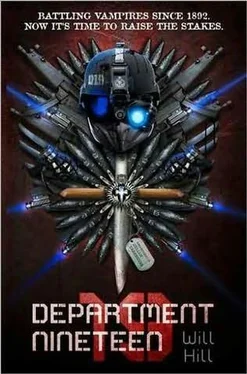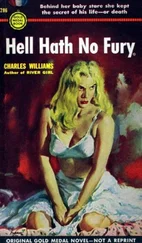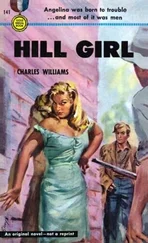William Hill - Department 19
Здесь есть возможность читать онлайн «William Hill - Department 19» — ознакомительный отрывок электронной книги совершенно бесплатно, а после прочтения отрывка купить полную версию. В некоторых случаях можно слушать аудио, скачать через торрент в формате fb2 и присутствует краткое содержание. Жанр: Боевая фантастика, Ужасы и Мистика, на английском языке. Описание произведения, (предисловие) а так же отзывы посетителей доступны на портале библиотеки ЛибКат.
- Название:Department 19
- Автор:
- Жанр:
- Год:неизвестен
- ISBN:нет данных
- Рейтинг книги:5 / 5. Голосов: 1
-
Избранное:Добавить в избранное
- Отзывы:
-
Ваша оценка:
- 100
- 1
- 2
- 3
- 4
- 5
Department 19: краткое содержание, описание и аннотация
Предлагаем к чтению аннотацию, описание, краткое содержание или предисловие (зависит от того, что написал сам автор книги «Department 19»). Если вы не нашли необходимую информацию о книге — напишите в комментариях, мы постараемся отыскать её.
Department 19 — читать онлайн ознакомительный отрывок
Ниже представлен текст книги, разбитый по страницам. Система сохранения места последней прочитанной страницы, позволяет с удобством читать онлайн бесплатно книгу «Department 19», без необходимости каждый раз заново искать на чём Вы остановились. Поставьте закладку, и сможете в любой момент перейти на страницу, на которой закончили чтение.
Интервал:
Закладка:
It was a dormitory.
A long, wide room, lined on both sides with thin beds covered in olive-green sheets and blankets. The beds were pristine, as though they had never been slept in, and the metal lockers that stood between them shone like new.
“What is this place?” he asked Frankenstein.
The monster opened his mouth to reply, but a deafening siren drowned out the words. Jamie pressed his hands to his ears, and when the siren paused, Frankenstein looked at him with a worried expression.
“You’re about to find out,” he said.
6
The Strand, London
June 3, 1892
The carriage clattered to a halt on Wellington Street, in front of the tall pillars of the Lyceum Theatre. A fine rain was falling, and the driver pulled his cloak tight around his shoulders as he waited for his passenger to disembark.
“Bring my bags, boy, both of them,” said the old man, impatiently. He stood in the cobbled road, the brim of his wide hat low over his face as he watched the sun descending toward Trafalgar Square.
“Yes, sir,” replied his valet, lifting a black leather surgeon’s bag and a tan briefcase down from the back of the carriage.
The aging black horse that had pulled them through London shifted as the weight was removed and took a step backward into the valet, sending the man down to one knee on the wet cobblestones and the tan briefcase to the ground. A sharpened wooden stake rolled out and settled at the feet of an overweight man in evening dress, who stooped down, grunting at the effort, and picked it up.
“You, boy,” he said, in a superior, goose-fed voice. “Have a care, would you? A man could go full-length with blasted logs rolling around his ankles.”
The valet picked the briefcase out of the road and stood up.
“I’m sorry, sir,” he said.
“See that you are,” said the man, and handed the stake back to the valet while his equally large wife giggled at her husband’s wit.
The valet watched them totter away toward the Strand, then handed the bags to his master, who had watched the exchange with an expression of impatience on his face. He took them without a word, turned, and strode up the steps. The valet waited a respectful second, then followed.
Inside the rich red lobby of the theater the old man waited for the night manager to greet them. Looking around, he took in the wide staircases that led up to the left and the right, the posters for previous productions that lined the walls, the majority of which showed the face of the man who had called him here: the actor Henry Irving.
The handsome, pointed face of the great Shakespearean was as well-known as any in London, and his rich baritone voice equally so. The old man had seen his Othello, two seasons previous, and deemed it entirely satisfactory.
“Professor Van Helsing?”
The old man awoke from his musings and regarded the stout, red-faced fellow who was standing before him.
“That is correct,” he replied. “Mr. Stoker, I presume?”
“Yes, sir,” the man replied. “I’m the night manager here at the Lyceum. Am I right in thinking that Mr. Irving explained why your presence was requested?”
“His message told me that a showgirl was missing, that he suspected foul play, and that I may have some expertise on the type of foul play in question.”
“Quite,” said Stoker. “But this isn’t just any showgirl. There’s. ..” He trailed off.
Van Helsing regarded the night manager more closely. His face was a deep beetroot red, his eyes watery, and his head enveloped in a gentle cloud of alcoholic vapor. He had clearly sought the courage for this night’s work at the bottom of a bottle.
“Mr. Stoker,” Van Helsing said, sharply. “I have traveled from Kensington at the request of your employer, and I wish to be about this business before the sun is long beyond the horizon. Tell me everything that I do not already know.”
Stoker looked up as though stung. “I apologize, sir,” he began. “You see, the girl who has vanished, a chorus girl by the name of Jenny Pembry, is a favorite of Prime Minister Gladstone himself, who has been kind enough to visit us no less than four times this year already. Her absence was mentioned by the prime minister after he attended our production of The Tempest, two days past, and Mr. Irving promised to find out what had become of her. When he reported back to the prime minister that he had been unable to do so, he was told that a telegram to the famous Professor Van Helsing of Kensington might prove useful.”
“And so here we are,” boomed Van Helsing, drawing himself up to his full bearing, his voice suddenly loud and deep. “Standing in an empty theater, with no reason to believe that this missing girl has done anything more mysterious than tire of the stage and choose a more dignified line of work for herself, and certainly nothing to suggest that this affair merits my attention. I fail to see what you expect me to do here, Mr. Stoker.”
The night manager had taken a step backward. He took a handkerchief from his pocket and furiously dabbed his forehead with it.
“Sir, if you would spare the time to examine the dressing rooms,” he said, his voice catching in his throat. “Mr. Irving informs me that the prime minister is most upset by this business, and I do not wish to tell him I have not exhausted all avenues of inquiry. Ten minutes, sir, I beseech you.”
Van Helsing looked at the small red-faced man before him and felt his anger subside, replaced with a deep frustration. Nine months had passed since he and his friends had returned from the mountains of Transylvania, and although none of them had spoken publicly about what had happened, rumor of what had taken place beneath the stone peaks of Castle Dracula had spread, and he had found himself deluged with requests for help, with everything from creaking floorboards to ghostly apparitions and, it now appeared, missing chorus girls.
He longed for the quiet of his surgery, where his research into what he had seen in the East could continue. But there were worrying stories emerging from the Baltic, tales of blood and shadow. Thankfully though, nothing yet suggested that the evil condition that had caused the deaths of two of his friends had found its way back to London, and God was to be praised for that, if for little else.
“I apologize to you, Mr. Stoker,” he said. “If you will lead the way, I will examine the dressing rooms, as you suggest.” He turned and spoke to his valet. “You may return to the carriage, boy. There is nothing here that will require your assistance.”
“Nonetheless, sir, I will accompany you so long as it does not offend.”
Van Helsing waved a hand at him, dismissively. “Do as you wish.”
Stoker led them through the theater, past the long rows of red velvet seats and the orchestra pit, through a door, and into the backstage area. The narrow passages were piled high with props and set furniture from old productions-a wooden tower from Verona, a broken fairy throne, ermine cloaks, rusting helmets and crowns, row upon row of daggers and swords, silver paint peeling from the wood and collecting in small drifts on the floorboards. As the night manager led Van Helsing and the valet through the dusty corridors, he talked nonstop, his confidence refueled by the professor’s apology and the contents of the small hip flask from which he was now openly taking regular sips.
“… Of course Mr. Irving is a great man, a truly great man, as fine an employer and as gracious a companion as he is skilled an actor. He has always encouraged the players to excel, to… improve , has given his time to tutor those with promise and to always gently, most gently, discourage those without. My own small ambitions have always found a sympathetic ear with him, although of course he has so many more important claims upon his time, a great man, truly. He has promised me, one man to another, that he will read my play, should I ever complete the cursed thing. What kindness! What generosity! Although I fear I may never be able to accept his kind offer. The confines of the play confound me endlessly, and I am close to accepting that it may not be the medium to which I am best suited. Perhaps the novel holds the answer? I think it may do. Perhaps I should write of a theater, from which people keep disappearing without a trace? That may entertain, if only for a short while. I may even presume to base the hero on Mr. Irving, such a great man, such a-”
Читать дальшеИнтервал:
Закладка:
Похожие книги на «Department 19»
Представляем Вашему вниманию похожие книги на «Department 19» списком для выбора. Мы отобрали схожую по названию и смыслу литературу в надежде предоставить читателям больше вариантов отыскать новые, интересные, ещё непрочитанные произведения.
Обсуждение, отзывы о книге «Department 19» и просто собственные мнения читателей. Оставьте ваши комментарии, напишите, что Вы думаете о произведении, его смысле или главных героях. Укажите что конкретно понравилось, а что нет, и почему Вы так считаете.












